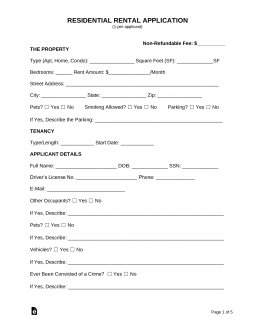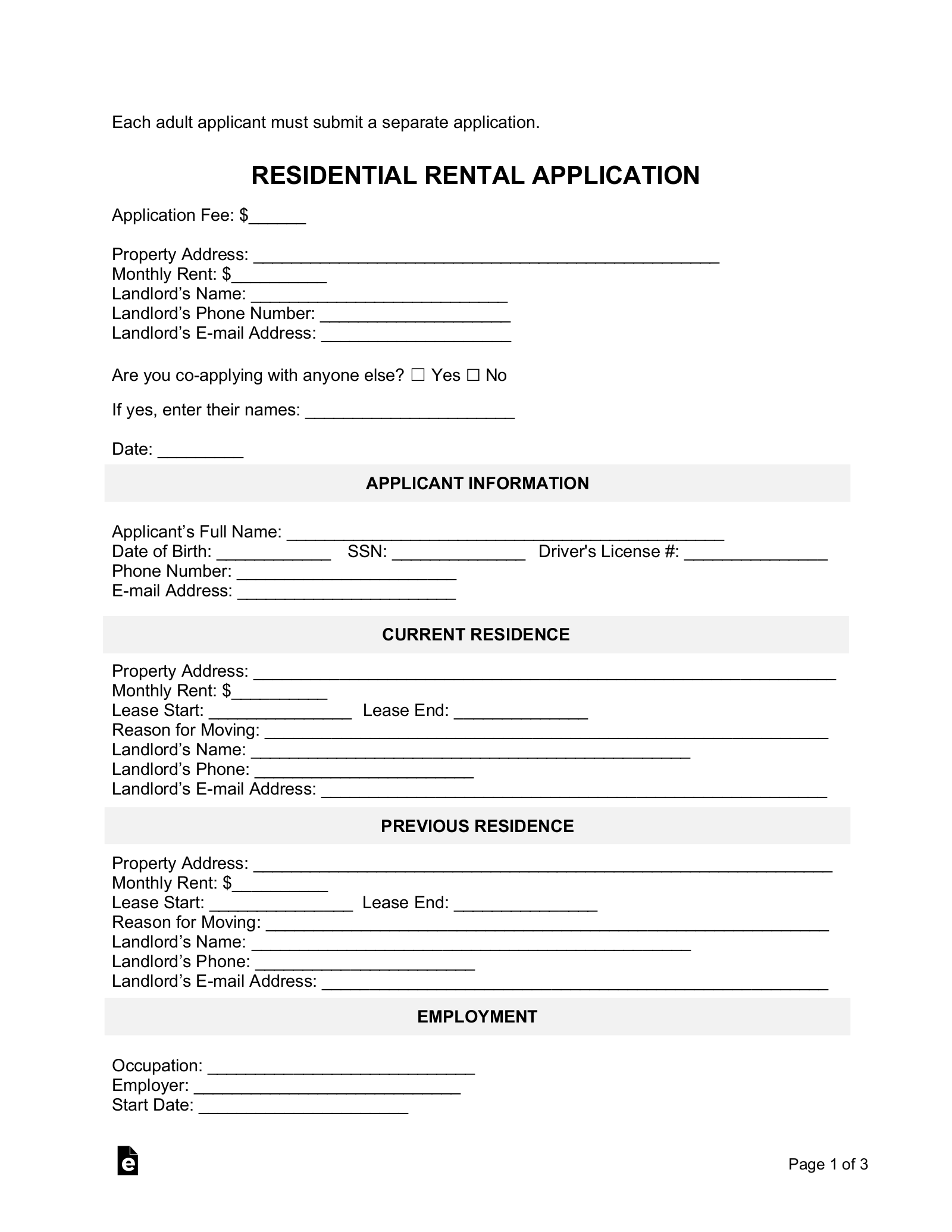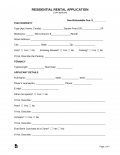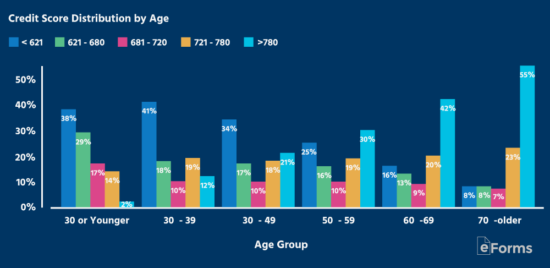Updated March 08, 2024
A rental application is a form landlords use to collect personal and employment information about a tenant to understand if they are a good fit for the property. The landlord commonly uses the information to run a consumer report (credit check) and verify any references.
By State
- Alabama
- Alaska
- Arizona
- Arkansas
- California
- Colorado
- Connecticut
- Delaware
- Florida
- Georgia
- Hawaii
- Idaho
- Illinois
- Indiana
- Iowa
- Kansas
- Kentucky
- Louisiana
- Maine
- Maryland
- Massachusetts
- Michigan
- Minnesota
- Mississippi
- Missouri
- Montana
- Nebraska
- Nevada
- New Hampshire
- New Jersey
- New Mexico
- New York
- North Carolina
- North Dakota
- Ohio
- Oklahoma
- Oregon
- Pennsylvania
- Rhode Island
- South Carolina
- South Dakota
- Tennessee
- Texas
- Utah
- Vermont
- Virginia
- Washington
- Washington D.C.
- West Virginia
- Wisconsin
- Wyoming
Table of Contents |
By Type (5)
- Assoc. of Realtors Version
- National Landlords Assoc. Version
- On-Site Version
- Simple Version
- Zillow Version
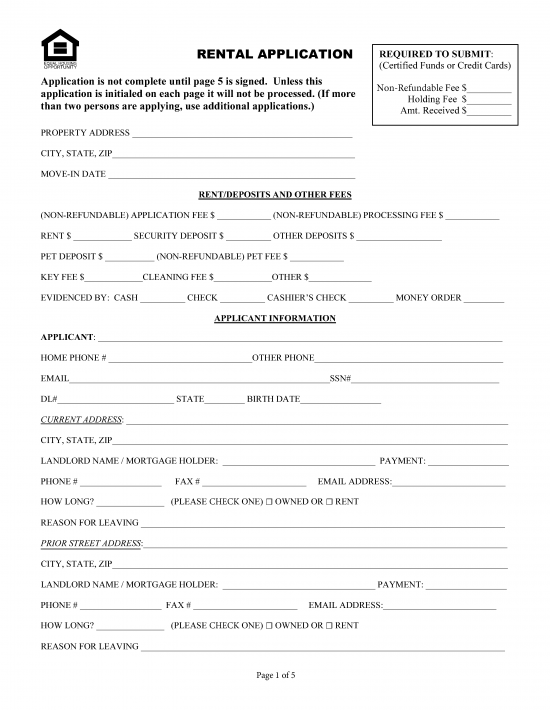 Assoc. of Realtors Version Assoc. of Realtors Version
Download: PDF
|
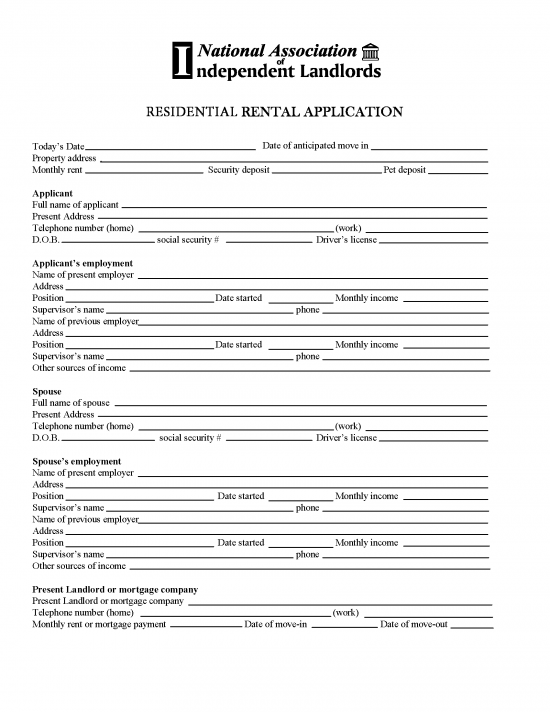 National Landlords Assoc. Version National Landlords Assoc. Version
Download: PDF |
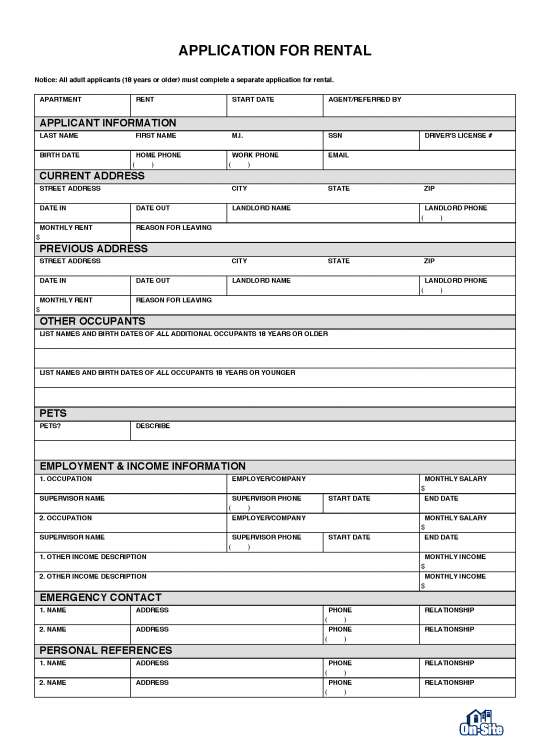 On-Site Version On-Site Version
Download: PDF |
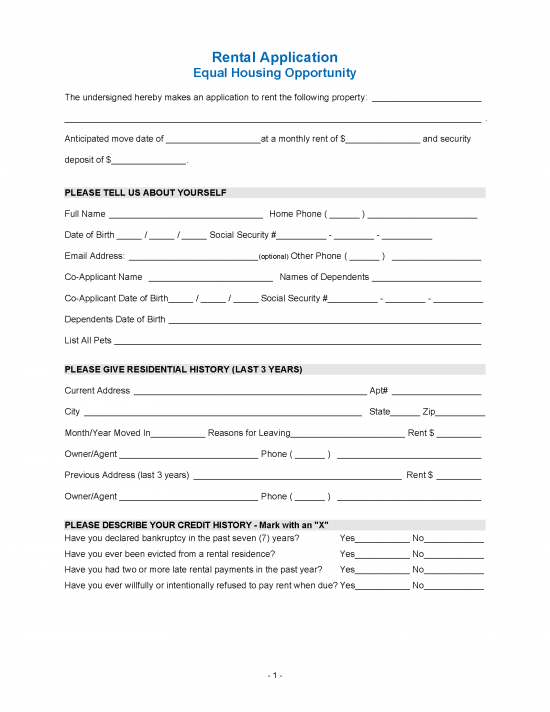 Simple Version Simple Version
Download: PDF |
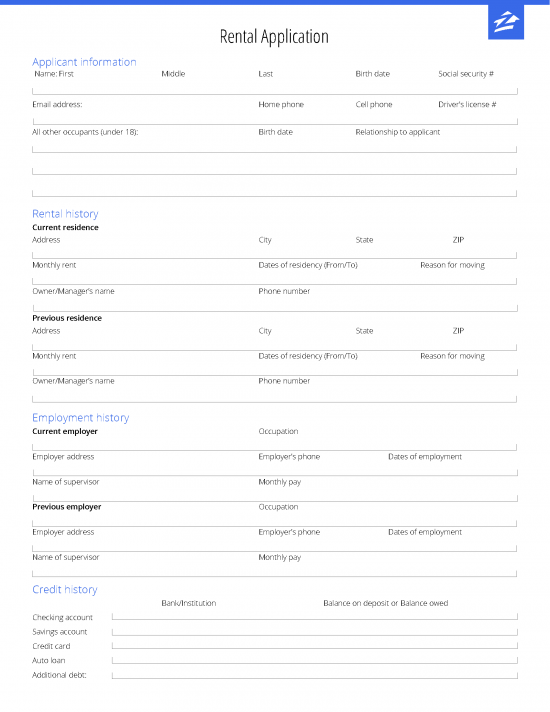 Zillow Version Zillow Version
Download: PDF |
How to Run a Background Check (6 steps)
- Tenant Completes the Rental Application
- Obtain a Credit Report
- Verifying the Tenant
- Communicate with Former Landlords
- Check the Sex Offender Registry
- Make a Decision
1. Tenant Completes the Rental Application
Download: PDF, MS Word, OpenDocument
The landlord should also attach the Fair Credit Reporting Act (FCRA) Disclosure, which includes the tenant’s rights.
Non-Refundable Fee ($)
A landlord is usually reimbursed for consumer reports generated to verify the tenant ($30 to $200[1]).
2. Obtain a Credit Report
In 2023, the average credit score was 715.[2] The landlord should consider the market conditions when deciding the tenant’s credit requirements.
Recommended Services
- Limited Consumer Report ($21) – RentPrep.com
- Detailed Consumer Report ($39.99) – MySmartMove.com
3. Verifying the Tenant

The landlord should verify the tenant’s work by contacting their supervisor or obtaining an employment verification letter.
Additional Documents
- Pay Stubs – Tenants can obtain from their employer or payroll provider.
- Tax Returns – To obtain IRS Form 1040 from the previous year.
4. Communicate with Former Landlords

It is common for tenants with a questionable history to contact their former landlords. If the tenant has multiple periods of under one year, it is generally a red flag.
Questions to Ask Previous Landlords
- Was the applicant ever late on rent?
- Was the applicant ever served a notice to quit or evicted?
- Was the applicant a loud tenant?
- Did the applicant leave the previous residence good standing?
- Was the applicant nice around co-tenants?
5. Check the Sex Offender Registry

Use the National Search Offender Database (or State Registry) to verify if a tenant is a former sex offender.
Cannot Reject due to Registry Status
Under federal law,[3] it is unlawful for a landlord to reject a tenant after finding out they are listed in a sex offender registry.
6. Make a Decision

The landlord must decide whether to approve or reject the tenant.
After Screening the Tenant
- If Approved – A lease agreement will be created.
- If Rejected – A rejection letter should be sent to the tenant that mentions where they can obtain a free copy of their consumer report.[4]
Maximum Rental App Fees ($)
| State | Maximum App Fee ($) | Laws |
| Alabama | No limit | No statute |
| Alaska | No limit | Landlord-Tenant Handbook Page 5 |
| Arizona | No limit | ARS 33-1321(B) |
| Arkansas | No limit | No statute |
| California | $52.46 | Cal. Civ. Code § 1950.6 |
| Colorado | No limit | Colo. Rev. Stat. § 38-12-903 |
| Connecticut | No limit | No statute |
| Delaware | 10% of the monthly rent or $50.00 | Del. Code tit. 25 § 5514(d) |
| Florida | No limit | No statute |
| Georgia | No limit | No statute |
| Hawaii | No limit | No statute |
| Idaho | No limit | No statute |
| Illinois | No limit | No statute |
| Indiana | No limit | No statute |
| Iowa | No limit | No statute |
| Kansas | No limit | No statute |
| Kentucky | No limit | No statute |
| Louisiana | No limit | No statute |
| Maine | The actual cost of a background or credit check | § 6030-H |
| Maryland | No limit (landlord must return unspent application fees over $25 within 15 days of receipt) | Md. Code, Real. Prop. § 8-213 |
| Massachusetts | Landlords may not charge (only brokers and agents permitted) | Mass. Gen. Laws ch. 186 § 15B(1)(b) |
| Michigan | No limit | No statute |
| Minnesota | No limit | Minn. Sat. § 504B.173 |
| Mississippi | No limit | No statute |
| Missouri | No limit | No statute |
| Montana | No limit | No statute |
| Nebraska | No limit | No statute |
| Nevada | No limit | No statute |
| New Hampshire | No limit | No statute |
| New Jersey | No limit | No statute |
| New Mexico | No limit | No statute |
| New York | Cost of background check or $20, whichever is less | N.Y Real Prop. Law § 238-A.1(b) |
| North Carolina | No limit | No statute |
| North Dakota | No limit | No statute |
| Ohio | No limit | No statute |
| Oklahoma | No limit | No statute |
| Oregon | No more than the average cost of screening applicants or the customary amount charged by tenant screening companies | Or. Rev. Stat. § 90.295 |
| Pennsylvania | No limit | No statute |
| Rhode Island | Not permitted, unless the tenant fails to deliver any provide their own reports | R.I. Gen. Laws § 34-18-59 |
| South Carolina | No limit | No statute |
| South Dakota | No limit | No statute |
| Tennessee | No limit | No statute |
| Texas | No limit | No statute |
| Utah | No limit | No statute |
| Vermont | Not permitted for residential tenancy | Vt. Stat. tit. 9 § 4456a |
| Virginia | $50.00 (not including extra expenses for performing background checks) | Va. Code § 55.1-1203(C) |
| Washington | No limit, but all costs must only be incurred in obtaining screening reports | Wash. Rev. Code § 59.18.257(1)(b) |
| Washington D.C. | No limit | No statute |
| West Virginia | No limit | W. Va. Code § 37-6A-1(2) |
| Wisconsin | No limit, but a landlord may only charge a maximum of $20 for a credit check | Wis. Admin. Code ATCP § 134.05 |
| Wyoming | No limit | No statute |

